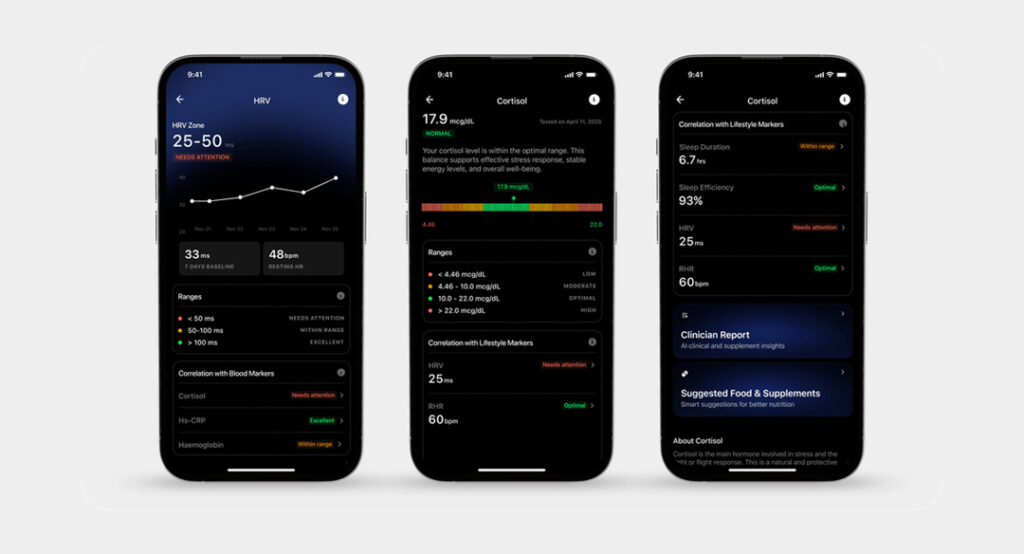This article on pregnancy and heart rate was first published in April 2022. It’s been checked, reviewed and updated.
Pregnancy can be both beautiful and unsettling. The body undergoes changes you may never have experienced – internally and externally.
One of the more confusing effects is heart palpitations. But what is a dangerous heart rate for a pregnant woman? We explain all:
Highlights
- Several factors can increase the risk of heart palpitations, including anxiety, caffeine, dehydration, electrolyte imbalance, weight gain, hormonal shifts, low blood sugar, low blood pressure, and anemia.
- Heart palpitations during pregnancy typically don’t require treatment if they’re occasional and not linked to an underlying heart condition.
- Lifestyle strategies – such as staying hydrated, using relaxation techniques, and limiting sugar, caffeine, and fat – may help reduce symptoms.
What do heart palpitations feel like?
Heart palpitations often feel like your heart is racing, pounding, skipping a beat, or fluttering. Some people may notice an extra heartbeat or feel like their heart is briefly pausing.
During pregnancy, your heart works harder to circulate increased blood volume through the body and to your baby. This added workload can result in palpitations.
Most of the time, they’re harmless and resolve after delivery. But in some cases, palpitations may signal a more serious condition, such as arrhythmia. If symptoms include shortness of breath, dizziness, confusion, or chest pain, seek medical attention.
Normal heart rates
Heart rate refers to how many times your heart beats per minute (bpm). A normal resting heart rate for adults (including during pregnancy) typically falls between 60–100 bpm.
Heart rate naturally rises during physical activity and can vary depending on age, fitness, and overall cardiovascular health. With regular aerobic training, your resting heart rate may decrease over time, meaning your heart becomes more efficient at delivering oxygen and nutrients.
Your maximum heart rate – the highest your heart can beat during intense activity – also shifts with age and fitness level.
Heart rate during pregnancy
Pregnancy increases total blood volume by 40–50% and cardiac output (the amount of blood the heart pumps per minute) by 30–40%. To support these changes, your resting heart rate typically rises by around 7–15 bpm.
Blood pressure may also drop, especially in early and mid-pregnancy. These physiological changes are normal but can lead to symptoms such as fatigue, dizziness, or shortness of breath.
Common symptoms of heart palpitations
- Fluttering – a sensation like your heart is flapping or flipping in your chest
- Irregular heartbeat – skipping beats, speeding up, slowing down, or a sensation of the heart briefly stopping
- Pounding – a strong or forceful heartbeat, sometimes felt in the chest, neck, or ears
What disrupts the heart rate during pregnancy?
Multiple factors can trigger or worsen heart palpitations, including:
- Anxiety or depression – mental health challenges can elevate heart rate and increase awareness of your heartbeat
- Caffeine – found in coffee, tea, chocolate, and some sodas
- High-sugar or high-fat foods – may provoke a racing heart
- Dehydration or electrolyte imbalance – electrolytes help regulate heartbeat; deficits can cause rhythm disturbances
- Anemia – common in pregnancy; occurs when plasma volume increases more than red cell count
- Excess weight – can strain the cardiovascular system
- Hormonal shifts – estrogen and progesterone changes may affect heart rhythm
- Hypoglycemia – low blood sugar, more likely in the first trimester
- Hypotension – low blood pressure, another common condition in pregnancy
What is a dangerous heart rate for a pregnant woman
In some cases, palpitations may signal a more serious cardiovascular issue. These may include:
- Arrhythmias – irregular heart rhythms like atrial fibrillation
- Myocarditis – heart muscle inflammation, often from viral infection
- Structural heart problems, such as congenital heart disease or valve disorders
- Thyroid disorders – especially overactive thyroid (hyperthyroidism)
- Cardiomyopathy or heart failure – rare but serious complications in pregnancy
Seek medical attention if palpitations come with:
- Chest pain or discomfort
- Breathing difficulty or shortness of breath
- Dizziness, confusion, or fainting
- Unusual fatigue
- Sudden swelling in feet, legs, or ankles
How to manage an irregular heart rate in pregnancy
Palpitations that are infrequent and not linked to known heart disease usually don’t require medical treatment. Instead, consider these lifestyle strategies:
- Hydration – drink plenty of water. Your body needs extra fluids during pregnancy. Avoid alcohol and nicotine, both of which can raise the risk of palpitations and harm the baby.
- Relaxation – deep breathing, meditation, and gentle movement can reduce anxiety and stabilize heart rate.
- Limit stimulants – reduce intake of caffeine, sugar, and processed fats. Stick to one small cup of coffee per day and consume chocolate or sugary snacks in moderation.
If you have an existing heart condition or other medical issue, work with your doctor to create a tailored, pregnancy-safe treatment plan.
Conclusion
Heart palpitations are common in pregnancy and usually harmless. They typically result from natural changes in blood volume, heart rate, and hormones. While they can be unsettling, they often resolve after childbirth.
However, if symptoms become frequent or are accompanied by chest pain, dizziness, or breathing issues, consult a healthcare provider. Managing stress, staying hydrated, and moderating sugar and caffeine intake can help keep your heart rhythm steady.
References






